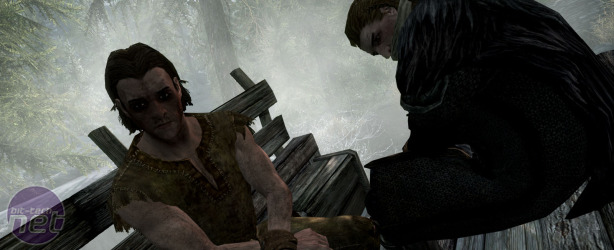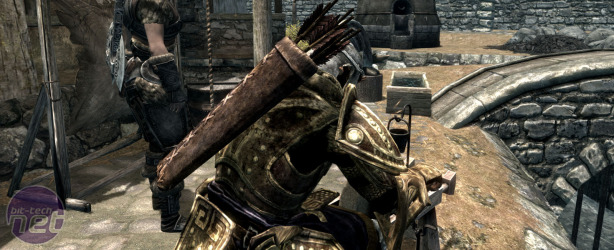
Skyrim Plot and Crafting
Four pages in and we haven’t really covered the plot yet? Not that it really matters; this is an Elder Scrolls game, so feel free to ignore the plot completely and do your own thing. In the interests of completeness, we’ll recount the basic premise: kill the dragons.Oh, okay, a bit more than just the basic premise then. Ulfric Stormcloak has killed the High King of Skyrim in a duel. This is a recognised form of succession in the North, but has been outlawed by the oppressive Empire which has also recently outlawed the worship of Telos, leading to hostile tension.
A dragon intervenes at Ulfric’s execution (and your own) to prevent him dying, and it soon transpires that you – a traveller from far-of parts - are dragonborn. All the ancient factions are keen to guide events as they see fit, from the Blades to the mystic Greybeards to a mysterious order called the Thalmor that seem to be the puppet-masters of the piece. Add in a few minor factions – the Companions, the Thieves’ Guild and so on – and there’s plenty to do in Skyrim.
As with Oblivion, there’s not an immediate need or desire to get going on the main quest. You weren’t meant to be at Ulfric’s execution, but some jobsworth Imperial Captain couldn’t be bothered to look into the matter so orders you a headman’s shave as well. Thanks. You’re supposed to feel aggrieved at the entire Empire for that decision, but we didn’t really care – why start a war over one Captain’s obstinacy?
We therefore did what we always do in Elder Scrolls games (well, this Elder Scroller anyway); we randomly wandered around picking ingredients, did some tasks, found some bandit hide-outs, got repeatedly mauled by frost trolls, ate those ingredients (once we had levelled up to a point where a mass tasting session wouldn’t kill us) to find out their properties, made potions, sold potions, crafted, bought equipment and so on.
Crafting, by the way, has been improved since Oblivion. Most towns have forges, tanning racks and workbenches to create or enhance weaponry and armour. Most settlements also have an alchemy station with which to make potions, and some have an enchanter table too. There’s no need to carry around heavy alembics and other alchemy items, or to buy a house to store them.
Lock-picking is also an area that’s been improved from Oblivion. The tumbler game has been replaced in favour of a more realistic mini-game. The mechanic of the game is to move the pick left and right with the mouse while rotating the lock with a thicker piece of metal. The lock rotates more when the pick is closer to the correct position, although too much force breaks the pick. The activity feels authentically like the real-life task, and it’s more intuitive than the tumbler system of Oblivion (to this writer, anyway).

MSI MPG Velox 100R Chassis Review
October 14 2021 | 15:04











Want to comment? Please log in.